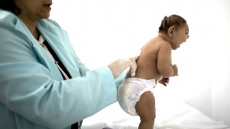Many bloodlines around the world, particularly of south Asian descent, may actually be a bit more Denisovan -- a mysterious population of hominids that lived around the same time as the Neanderthals - researchers including Indian-origin scientists have revealed.
The team from Harvard Medical School and University of California-Los Angeles (UCLA) has created a world map and also used comparative genomics to make predictions about where Denisovan and Neanderthal genes may be impacting modern human biology.
The analysis also proposes that modern humans interbred with Denisovans about 100 generations after their trysts with the Neanderthals.
Denisovan genes can potentially be linked to a more subtle sense of smell in Papua New Guineans and high-altitude adaptions in Tibetans.
Meanwhile, Neanderthal genes found in people around the world most likely contribute to tougher skin and hair.
Most non-Africans possess at least a little bit Neanderthal DNA.
“There are certain classes of genes that modern humans inherited from the archaic humans with whom they interbred, which may have helped the modern humans to adapt to the new environments in which they arrived,” explained senior author David Reich, geneticist at Harvard Medical School.
On the flip side, there was negative selection to systematically remove ancestry that may have been problematic from modern humans.
“We can document this removal over the 40,000 years since these admixtures occurred,” Reich added.
Reich and lab members, Swapan Mallick and Nick Patterson, teamed up with previous laboratory member Sriram Sankararaman, assistant professor of computer science at the University of California, Los Angeles for the project.

They found evidence that both Denisovan and Neanderthal ancestry has been lost from the X chromosome as well as genes expressed in the male testes.
The team theorises that this has contributed to reduced fertility in males, which is commonly observed in other hybrids between two highly divergent groups of the same species.
The researchers collected their data by comparing known Neanderthal and Denisovan gene sequences across more than 250 genomes from 120 non-African populations publicly available through the Simons Genome Diversity Project.
The analysis was carried out by a machine-learning algorithm that could differentiate between components of both kinds of ancestral DNA, which are more similar to one another than to modern humans.
The study's limitation is that it relies on the current library of ancient genomes available.
“We can't use this data to make claims about what the Denisovans or Neanderthals looked like, what they ate, or what kind of diseases they were susceptible to," said Sankararaman, first author on the paper. “We are still very far from understanding that.”
The new map of archaic ancestry was published in the journal Current Biology.



